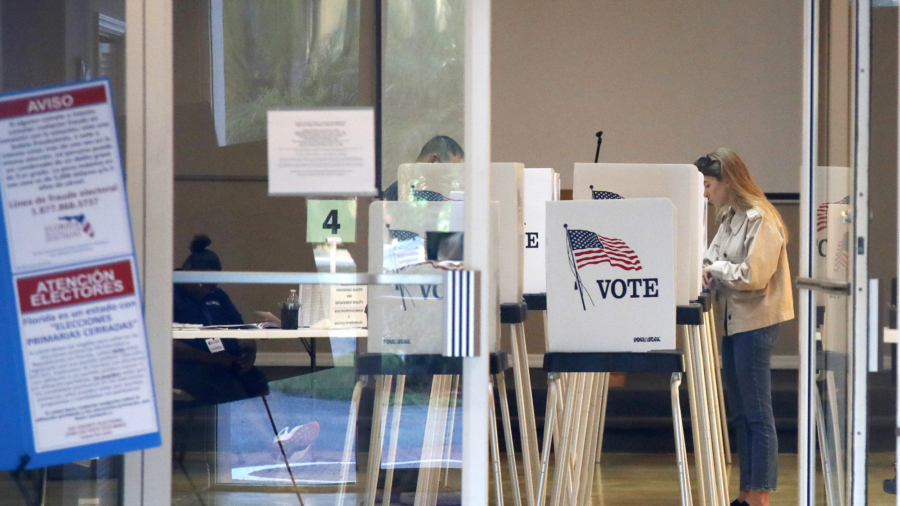A Florida law that requires convicted felons to pay off outstanding fines and fees related to their sentences before they can register to vote was in part unconstitutional, a federal judge ruled.
With the November election up ahead, the decision by U.S. District Judge Robert L. Hinkle on Sunday could potentially give way to hundreds of thousands of ex-felons who have completed “all terms of their sentence including probation and parole” the ability to register to vote, possibly expanding the rolls in a battleground state.
In his 125-page ruling (pdf), Hinkle declared that parts of Florida’s law were unconstitutional. He also ordered the state to put in place a new process that would help ex-felons determine whether they are eligible for vote.
“This pay-to-vote system would be universally decried as unconstitutional but for one thing: each citizen at issue was convicted, at some point in the past, of a felony offense,” the judge wrote in his opinion. “A state may disenfranchise felons and impose conditions on their re-enfranchisement. But the conditions must pass constitutional scrutiny. Whatever might be said of a rationally constructed system, this one falls short in substantial respects.”
In November 2018, Florida passed an amendment, commonly referred to as Amendment 4, to the state’s constitution that allows ex-convicts to vote “upon completion of all terms of sentence including parole or probation,” but excludes those who were convicted of murder or felony sexual offense. Before the amendment, all former convicted felons were permanently disenfranchised without a grant of executive clemency.
Governor Ron DeSantis (R) subsequently signed a bill, Senate Bill 7066, last year mandating that all formerly incarcerated people pay off restitution, court fees, and fines before their voting rights are restored (pdf). The law faced intense opposition from voting rights advocacy groups, who argue that it denies people with felony convictions the right to vote and penalizes them based on their inability to pay off fees and fines.
Several ex-felons and advocacy groups then brought a lawsuit against state officials, challenging the constitutionality of the requirement to pay off all legal financial obligations (LFO). The United States District Court for the Northern District of Florida consolidated the cases and issued a preliminary injunction in favor of the ex-felons, prompting the state to appeal. The court of appeals upheld the injunction in February this year.
Hinkle sided with the plaintiffs saying that requiring ex-felons who are otherwise eligible to vote but are “genuinely unable to pay the required amount” was unconstitutional. He also said the requirement to pay fees and costs as a condition of voting is also unconstitutional because it amounts to a tax, which violates the Twenty-Fourth Amendment of the U.S. Constitution.
He said that the State can “condition voting on payment of fines and restitution that a person is able to pay but cannot condition voting on payment of amounts a person is unable to pay or on payment of taxes, even those labeled fees or costs.”
The judge also ordered the division of elections to adopt a new process that allows ex-felons to request an advisory opinion on whether they are eligible to vote and toe request a statement of the fine or restitution that must be paid by the requesting person. If within 21 days, an answer is not given or if the division of elections does not show that the requesting person is able to pay and provides a factual basis for the assertion, then the person should be allowed to vote.
Daniel Smith, the chair of the Department of Political Science at the University of Florida, previously did an analysis that found over 774,000 people from Florida with felony convictions who had been released or are under county supervision owe some amount of LFO (pdf).
The American Civil Liberties Union (ACLU), who is representing the plaintiffs along with other civil rights groups, welcomed the federal court’s decision in a statement.
“Today’s ruling is a powerful reminder that no one can trump the U.S. Constitution. Our democracy requires that every eligible voter have equitable access to the ballot box,” Daniel Tilley, ACLU of Florida legal director, said in the statement.
Florida governor’s office did not immediately respond to The Epoch Times’ request for comment.
From The Epoch Times

